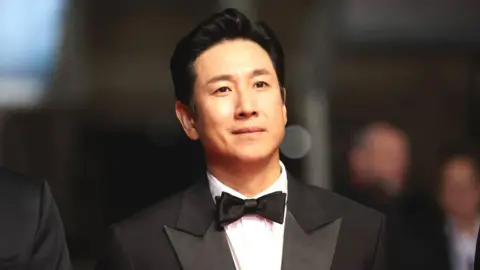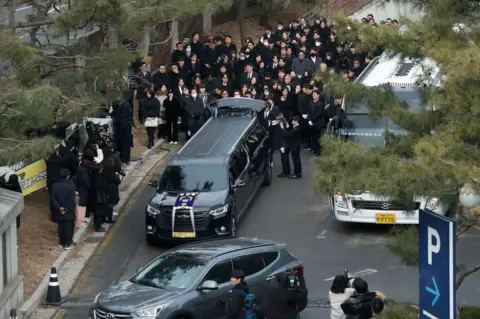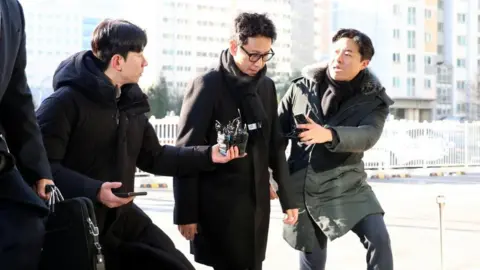Lee Sun-kyun: A quiet farewell for Parasite star who died in the spotlight
 Getty Images
Getty ImagesSouth Korean star Lee Sun-kyun's family bid him farewell in a private funeral, shutting out the cameras that had stalked him in his last months when he was under investigation for drug use.
The entertainment industry has been put on hold, with several events cancelled, as former colleagues turned up to remember Lee. On Friday, his family mourned him along with close friends and colleagues, after appealing to Korean media to stop making "painful and abrupt" visits to Lee's home, agency and funeral.
His alleged last note to his wife, which a Korean media outlet was criticised for publicising, CCTV footage of the last drive he reportedly took, reruns of his last public appearance for police questioning the day before he died - all of it has been watched millions of times on YouTube.
The 48-year-old actor was found dead in a car in Seoul on Wednesday - police believe he killed himself. It was a shock to the country where he had become a household name during his more than 20-year-long career, before he shot to international fame in the acclaimed hit Parasite.
Beyond sympathy and grief, there is also anger over the relentless public glare many believe he was subjected to since October when police began questioning him. Outside South Korea, there is surprise that a drugs investigation into a celebrity could unleash such a tragic scandal.
 Getty Images
Getty ImagesThe fall of a 'model' celebrity
Lee's fall from grace was as stunning as his rise. A hugely successful family man, he was beloved in a competitive and conservative South Korea that expects celebrities to be model citizens.
The "abundance of attention... social pressure and finger pointing," that South Korean celebrities face during a police investigation leads to "destructive shame", psychiatrist Peter Jong-ho Na told the BBC's Newshour.
In October, a hostess at a Seoul bar accused Lee of taking drugs, including marijuana and ketamine, with her. He denied consuming them knowingly.
He was never charged and the investigation was still underway when he died. But the allegations - and reports that this happened at a bar with female escorts - marred what had been seen as a perfect, wholesome reputation.
"I sincerely apologise for causing great disappointment to many people by being involved in such an unpleasant incident. I feel sorry for my family, which is enduring such difficult pain at this moment," Lee told reporters in early October.
He underwent three rounds of questioning, with one session last Saturday lasting 19 hours, according to Yonhap News. Lee was dropped or opted out of advertisements and productions that were underway. Some media reports even suggested that advertisers could sue him for millions.
Police said that they had rejected Lee's request that his final appearance for questioning happen discreetly. They have been accused of not being more sensitive to the public pressure Lee would face, but they said the proceedings had been "conducted with [his] consent".
The national police commissioner also weighed in, denying that the investigation had led to Lee's death - but he said he would look into whether there had been any problems.
 Reuters
ReutersKorean media covered the case extensively for a hyper-connected audience. By some estimates, more than 90% of the country uses social media. So incremental updates on Lee arrived in minutes via messenger services like KakaoTalk or YouTube. The intense appetite only fuelled the tabloid-style drip-feed, even prompting national broadcaster KBS to publish the private conversation Lee had with the female bar staff.
"He didn't die because of drugs, he died because of the humiliation other people gave him," reads one comment online.
Another one on YouTube says: "The punishment for defamation in this country is extremely weak. I hope all the people who wrote articles carelessly and spread them without any accurate basis would reflect on themselves."
An imperfect victim
But not everyone has been sympathetic to Lee's downfall - he was not seen as the perfect victim, given he had admitted to being at a bar with a female escort, and taking what she had given him, although he said he did not know they were drugs.
The insinuation of adultery was scandalous - it was a crime here until 2015.
And the investigation itself was part of a wider crackdown on drugs, which has seen tens of thousands of arrests.
This has support in South Korea, where there is huge social stigma associated with drug use - even ordinary people are ostracised by family and friends for taking drugs and the vilification is only amplified for celebrities. Such allegations are enough to ruin careers.
 Getty Images
Getty ImagesSouth Korea is not exactly an outlier in the region, when it comes to conservative social values or hardened attitudes towards drugs. Singapore, China and Japan are all in a similar boat as compared to Western countries where attitudes to drugs have softened and addiction often leads to rehab. In Asia, Thailand is the only country to legalise cannabis trade.
Where South Korea does differ is perhaps the high standard public figures, including celebrities, are held to, and the pressure this inevitably brings.
"Korea has a very strict moral standard for celebrities compared to other countries," Korean pop culture critic Ha Jae-kun told BBC after the death of K-pop star Moonbin earlier this year sparked similar questions. And it's not restricted to celebrities. In 2020, the Seoul mayor is believed to have killed himself after he was accused of sexual harassment.
There is also little room for seeking help in South Korea, as is the case with many other Asian countries, where there is a reluctance to talk about mental health and drug use.
And it has one of the world's highest suicide rates - this year alone has seen headlines ranging from K-pop stars and teens buckling under untold pressure, to a 23-year-old teacher who killed herself over parental bullying.
Lee's death is yet to be officially ruled a suicide - but his family has said there will be no autopsy.
Outside the funeral home, fans stuck yellow post-it notes, mirroring the tributes that have flooded Korean social media: "This cold winter, may you rest in the warmth of spring wherever you go."
Additional reporting by Fan Wang

Help and support
If you're affected by any of the issues in this article you can find details of organisations who can help via the BBC Action Line.
In the UK you can call for free, at any time, to hear recorded information on 0800 066 066. Elsewhere in the world, you can get help here.

